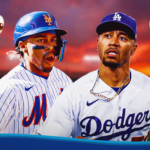In the midst of the recent release of wide-reaching changes for the MLB postseason that are being discussed, the sport of baseball is seemingly straying further and further away from what has made it such a beloved sport, and more importantly, one that brings people from different walks of life together. From being America’s Pastime and instilling a valued sense of gamesmanship at an early age, to helping foster the next generation of athletes and their friends, baseball has impacted each and every one of us in some sort of way.
Commissioner Rob Manfred, after having taken over for Bud Selig in 2015, has not only led the MLB down a path of having an identity crisis but in the process of steering the sport the wrong way he has also provided it with less of a cushy base to fall back on. Originally supported by its impact on younger generations and the communities in which they played in, the MLB has pushed money to the front of the line in terms of the sport’s priorities, leaving its supporting pillars behind.
The ‘leaked’ changes that the league seems to be pandering around for postseason play encourages teams to compete, but only compete so they can make the expanded field of playoffs, which would include 14 teams total, seven per league. With there being 30 MLB teams in the entire league, the fact that one less than half of that number would constitute a playoff team each and every season makes the art of competing mean a little less.
Tanking is never encouraged, yet some franchises see that as the only way out of undoing countless years of mismanaged rosters, farm systems, and payroll structures. Regardless of the type of team it is, whether they are a small market or a member of a large market, makes no difference here, as each and every franchise has the money on hand and available to offer out to the best players each season.
Larger markets, like the Bostons, Los Angeles’, New York’s, and the Chicago’s of the world, seem to brainwash fans across the world each and every year that they must be in competitive modes every year, and with that, comes the responsibilities of spending inordinate amounts of money. While money does ultimately drive the best product to the best teams, the fact of the matter is that with there being no set salary cap in the MLB, teams have free reign over who and what they can choose to pay, and for how much or how little.
Small markets, like the Milwaukee’s, Kansas City’s, Seattle’s, Oakland’s, and the Detroit’s of the world, struggle each and every season to produce competent rosters and fill them with cheap talent before they seek out large contracts and leave for more financially-stable areas. While there are no finite solutions to solving the discrepancies between these two types of markets, the fact remains that the main deterrent that sets these two apart lies in the willingness to spend money, and not the lack of available funds on hand to use.
Not all decisions need to be focused on money, but for the MLB, their determination to stray away from what has made this sport so successful all lies in monetary reasons, including their proposed postseason changes. Instead of dedicating countless hours and dollars to a cause that should just be left well alone, here are three other topics that the league would be smart to dive into instead.
Minor League Pay
The entire Minor League system seems to be falling apart, crumbling at its seems and taking out the MLB from below. What has caused the bottom to fall out from underneath is the simple unwillingness to dedicate the needed funds to the MiLB when they so desperately need it.
As an example, the New York Mets just built a beautiful new Spring Training facility down in St. Lucie, FL, which cost $57 million in total to build. While that overall cost was mostly fronted by the city (the Mets only paid $2 million towards the total cost), the biggest fallacy in this entire process was that this new clubhouse and complex would be used by all players within the Mets’ organization.
Apparently used as some sort of perverted motivational tool, MLB.com writer for the Mets Anthony DiComo reported that the Mets are not allowing their minor-league players that will be playing in St. Lucie for their Single-A season to use the new clubhouse, as a way to “give minor leaguers a reminder of the status that they are trying to earn.” In essence, the franchise is saying that because players are not good enough to be in the major leagues at this point, they do not deserve to actually experience a little bit of a life of luxury and must continue to struggle through pitiful wages, bland meals, and Craiglist housing to make ends meet season after season.
The $2 million that the Mets contributed to the overall project could have provided 40 minor leaguers with $50,000 in annual salary, which would be a far cry from their $1100 per month wage that some at the rookie-level currently earn.
Manfred has painted the MiLB into a corner and has cast them as the bullies in this fight, while the MLB is truly the big bully that is trying to make the MiLB give in and lose even more revenue. If teams would put more of an importance on paying their farm system, and if the league were to pass a much-improved mandate for how players should be paid (regardless of based on an experience scale or what), then their time would be much better spent.
Minority Integration into team staffs
Diversity in coaching staff around the MLB is atrocious, and no one seems to be doing anything about it – no one.
Dave Martinez, Dave Roberts, Luis Rojas, Charlie Montoya, and Dusty Baker represent the only five current MLB managers that are persons of color, showing a real disparity between a problem that has been plaguing many professional sports for a very long time.
The NFL has the Rooney Rule, and the MLB has its own version, the Selig Rule, stating that organizations must interview minority candidates when needing to fill a top-level position. Even if that rule has been followed to its furthest extent, with no clear evidence saying that it necessarily has, the results still have produced no real progress.
Roberts and Baker are the lone African American managers in the MLB, 13 minority candidates interviewed for managerial openings (six were first-time interviews), and there are six minority bench coaches for the 2020 season, which could hopefully produce more minority managers in the near future. The numbers are quite clear, but what is not is the league’s stubbornness to not address this pressing issue.
Many players across the MLB are of minority descent, have trouble acclimating to United States ways and cultures, and struggle to find a sturdy resource to go to when they are in need. With teams lacking that source, which many players may consider a person of color, teams are showing that they are stuck in their ways, and the league is demonstrating that what has always been the norm does not have any near plans of changing anytime soon.
Dave Stewart, a former General Manager of the Arizona Diamondbacks, still is the only minority candidate to be hired as a first-time GM that was brought in from outside of the organization (and not appointed by the MLB like Omar Minaya was when the Montreal Expos were created in 2002). Only on the job for two seasons, Stewart is the lone front-office member of color in a very white world, which unfortunately epitomizes the problem that the MLB has had all along.
Grouping the sport of baseball and the MLB together as one entity is not fair, simply because the sport of baseball has been welcoming people from all walks of life, color, and descent ever since it was born. The organization that is the MLB has not only fostered the problems of racism and poverty, but they have also tarnished their image and the image of the children’s game that so many people have come to love over the years.
Things can be still be corrected, the ship can still be righted – it just takes affirmative action by the MLB to understand that while these current issues may have been created and pushed ahead by themselves, that they are the only true solution in this very convoluted problem.




